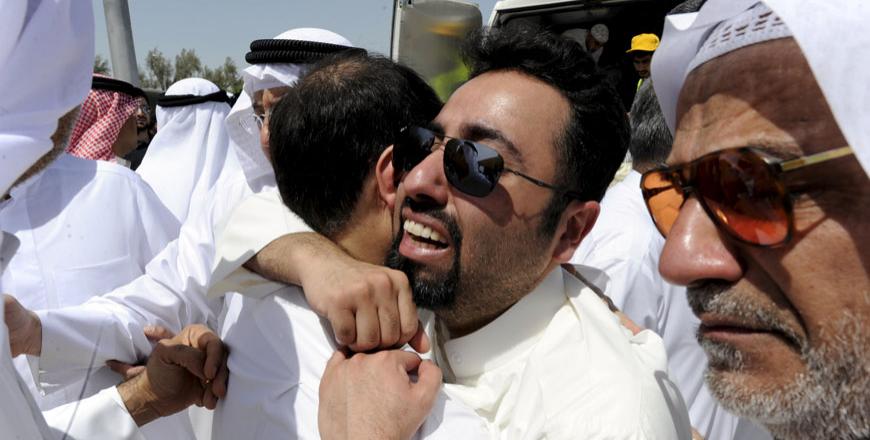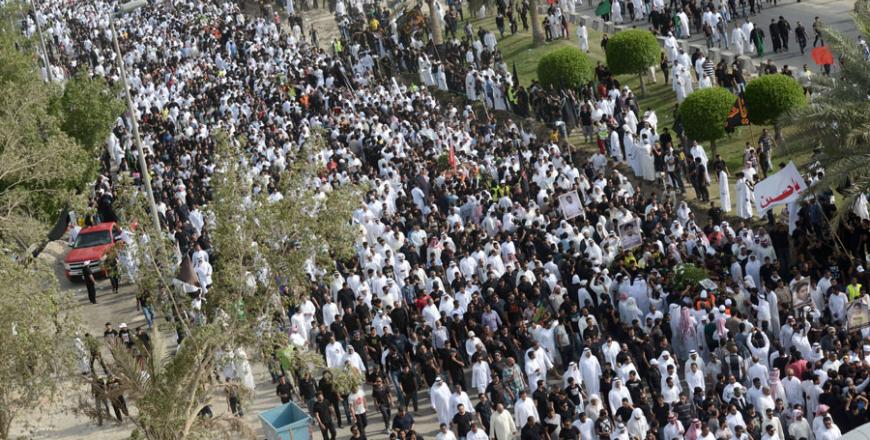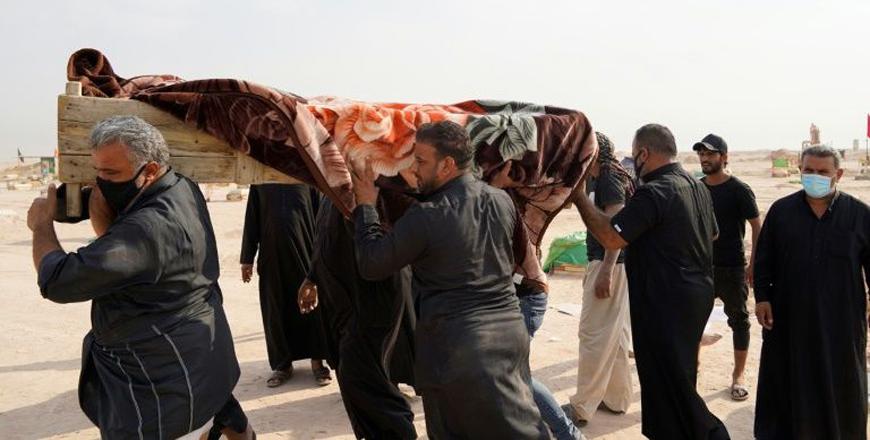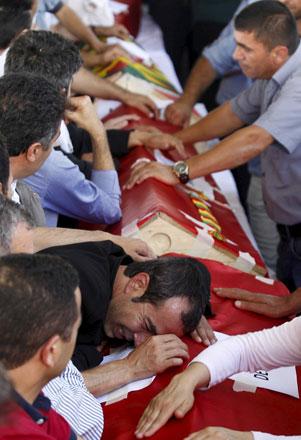You are here
Kuwait’s Shiites mourn blast victims and lament sectarianism
By Reuters - Jun 27,2015 - Last updated at Jun 27,2015

A relative mourns after the bodies of seven victims of Friday's bombing were transferred to vehicles to be transported to Karbala, Iraq, at Al Jafariya cemetery in Suleibikhat, Kuwait, on Saturday (Reuters photo)
KUWAIT — As a body passed, shrouded in Kuwait's flag, dozens of hands were raised from the crowd to support the bier and help carry it towards the Shiite Muslim cemetery where most victims of Friday's Daesh mosque attack were buried on Saturday.
Among the thousands of Shiite mourners at the Jaafari cemetery in the Sulaibkhat district of Kuwait City, shock and grief were tempered by a grim sense of resignation that a long-feared attack on their community had finally taken place.
Relations between Islam's main sects have traditionally been less fraught in Kuwait than in other Gulf Arab states. But they have been undermined by a rise in Salafist Sunni Islam, which brands Shiites heretical and the sectarian hatred unleashed by wars in Iraq and Syria, mourners said.
Friday's attack, which killed 27 and injured more than 200 at the Imam Sadeq Mosque in central Kuwait City, was claimed by Daesh's Wilayat of Najd division, which last month bombed two Shiite mosques in Saudi Arabia, killing 25.
"I was expecting this to happen. What makes us different that we should not be a target? It's clear no country here is immune," said Manaf Behbehani, a marine biology professor at Kuwait University, standing among the mourners as the bodies processed towards the graveyard.
"We had sectarianism before Syria. There were examples, even in parliament, of language that was very strong. We had tensions, but there was no violence. No attacks. No bombing," he added.
Among the Kuwait flags and traditional banners of mourning, in red, black or green, and bearing the names of early Shiite Imams some placards were carried by Saudis or Bahraini members of the sect who had come in solidarity.
Three young men from Saudi Arabia's Qatif district arrived on Saturday morning and stood, dressed in black, watching the funeral procession pass by.
"We're not scared. We're going to be strong. It doesn't matter if we're martyred," said one of the three, who declined to give his full name, referring to the risks that Gulf Arab Shiites now face after three deadly bombings in a month.
Prayers and sobbing
The crowd, thousands strong, was packed tightly along a narrow tree-lined boulevard leading from the Haj Ibrahim Al Haji Hussein Al Maraafi Mosque towards the graves. Some raised their hands in the air or clapped their chests with open palms as they responded to the chants.
"No Sunni, no Shia, one, one Islam", men along the funeral route chanted at one point, and then later: "Down with Daesh! Down with Daesh!" using the Arabic acronym for Islamic State.
In the distance the sound of women ululating rose above the deeper chants of the men. The next bier that passed along the route carried a small body, and some of the men carrying it were sobbing uncontrollably.
The mid afternoon heat was intense and, it being Ramadan, most had fasted since dawn. To one side, a man slouched unconscious in a plastic chair, overcome by heat and emotion, as a medic attempted to revive him.
The bodies were carried across a dusty field, flags and banners blowing stiff in the strong breeze, to the southwest extremity of the graveyard, the point closest to Mecca, where they were lowered and prayers were performed.
Next to a long row of open graves, diggers dressed in yellow overalls lounged in the shade against the piles of earth, the handles of their shovels sticking out like needles from a pin cushion.
Cars had parked two deep along the access road that divided the Shiite cemetery, on the western side, from the Sunni cemetery on the eastern.
"The dead are separated only by the walls above the ground. Under the ground, there's no such wall," said Behbehani, referring to this sectarian divide.
As the bodies arrived at the graveside, the sound of chanting rose from a murmur to fill the air.
Related Articles
QATIF, Saudi Arabia — Tens of thousands of Saudi Shiites gathered Monday for a mass funeral for the victims of a mosque bombing authorities
BAGHDAD — Mohammad Al Bahadli dug into Iraq's hot desert sand with bare hands to reach his father's corpse."Now he can finally be with our p
GAZIANTEP, Turkey — Crying and shouting slogans against jihadists, relatives of the victims of the suicide bombing on Turkey's border with S














